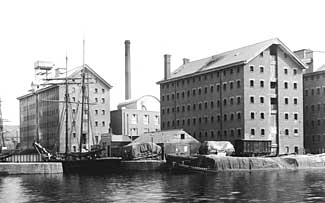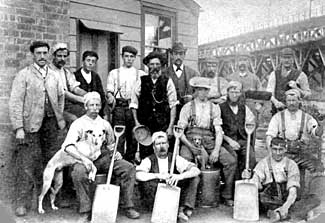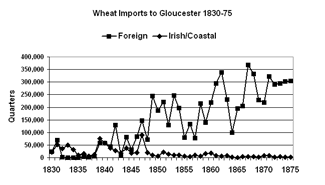 Corn
Merchants Corn
Merchants
Corn merchants imported
wheat, oats, barley, etc, and arranged for sacks to be stored temporarily
in their own warehouses until they were delivered to a customer.
Gloucester became a major corn port serving the growing industrial
towns in the Midlands. Early imports mainly came coastwise from
other parts of Britain and Ireland, but in later years much foreign
corn was imported. The principal merchants during the 19th century
are listed below.
In later years, the warehouses
at Gloucester were mainly managed by warehousemen who did not own
the corn being stored but just charged a rent for the space occupied.
 Corn
Handling Corn
Handling
The corn arrived in bulk
in a ship's hold, and in the early days, men were employed to shovel
the corn into sacks that were checked for weight and then lifted
into the warehouse. When the level in the hold was getting low,
it was common to see rats emerging, and a good ratting dog was an
important member of the team. When the corn was sold, the sacks
were taken out of the warehouse and sent on to the customer by boat
or by rail. The employees who handled the sacks were usually called
corn porters.
In later years, floating pneumatic
elevators were used at Sharpness to suck the corn up and blow it
directly into the warehouse.
 Wheat Imports Wheat Imports
The
corn trade was risky as demand and prices were very dependent on
the quantity and quality of the home harvest. In the early
days, foreign imports were subject to a sliding scale of duties
which varied according to the average price of wheat in home markets.
However, import duty was effectively abolished by the repeal of
the Corn Laws in 1846, and the graph shows how Gloucester shared
in the subsequent growth in foreign imports.
Millers
In the early
days, most of the corn was sent on to existing water-powered mills
in the Midlands, but during the 19th century, some steam-powered
mills were established around the docks. The principal millers
during the 19th century are listed below.
Principal Firms in the Corn Trade in the 19th Century
- Henry Adams & Co
- Bretherton & Pitchford
- G & W E Downing, maltsters
- Foster Brothers, oil and cake mills
- S H Fox & Co
- J & J Hadley, City Flour Mills (more)
- William Hall & Sons, St Owens Mill
- J P Kimberly
- S W Lane
- W C Lucy & Co
- Phillpotts & Co
- Priday Metford & Co, City Flour Mills (more)
- James Reynolds & Co, Albert Flour Mills
- Thomas Robinson & Co
- Spiller & Co
- J & C Sturge
- Turner Nott & Co
- Vining & Co
- Wait James & Co
- John Weston & Co
|
 Corn
Merchants
Corn
Merchants Corn
Handling
Corn
Handling Wheat Imports
Wheat Imports